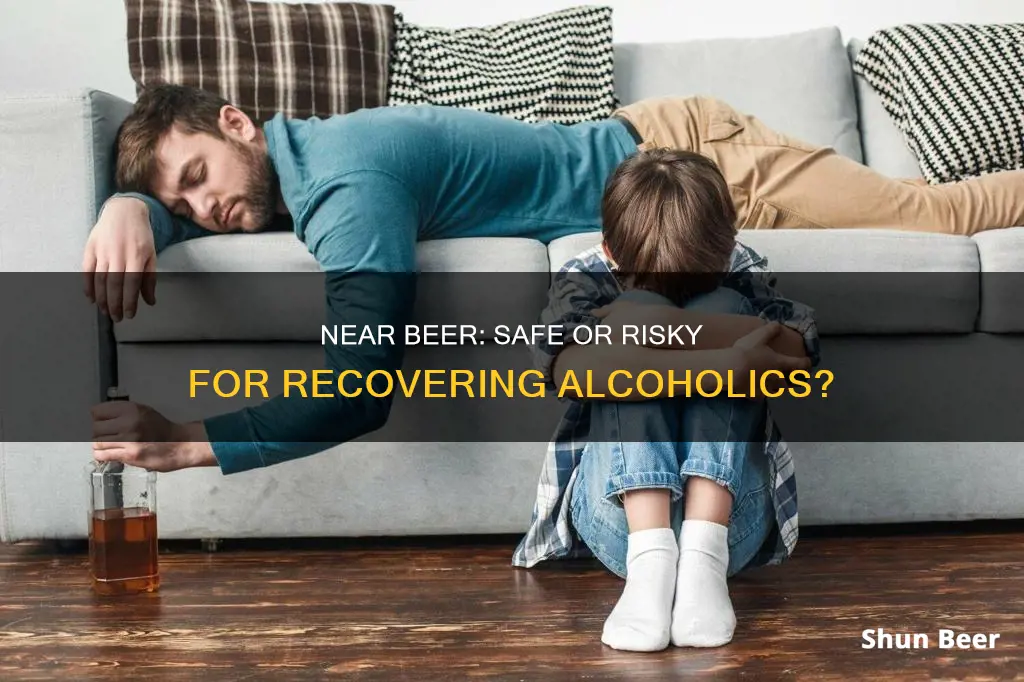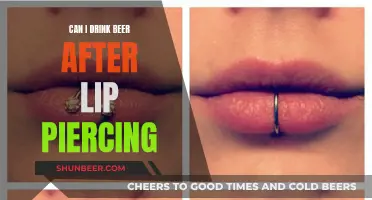
Whether or not a recovering alcoholic should consume non-alcoholic or near beer is a complex question. On the one hand, non-alcoholic beer typically contains very little alcohol, with a maximum of 0.5% ABV in the US, and is unlikely to get someone drunk. This means that, technically, a recovering alcoholic could consume it without breaking their sobriety. However, the more pertinent question is whether they should. Several risks are associated with non-alcoholic beer consumption for recovering alcoholics, including the potential for psychological triggers, physical responses, and the maintenance of drinking habits. Ultimately, the decision is a personal one and should be made in consultation with professionals and addiction specialists.
| Characteristics | Values |
|---|---|
| Alcohol content | Non-alcoholic beer usually contains 0.5% ABV. |
| Risk of relapse | Non-alcoholic beer can trigger cravings and set up the circumstances for a relapse. |
| Psychological triggers | The taste, smell, and ritual of drinking non-alcoholic beer can awaken memories associated with past alcohol use. |
| Physical response | The brains of individuals with a history of alcohol addiction may be more sensitive to alcohol, meaning even a small amount could spark a desire for more. |
| Maintenance of drinking habits | Consuming non-alcoholic beer may maintain the behavioral habit of drinking. |
| Delay in developing new coping mechanisms | Consuming non-alcoholic beer might delay the development of healthier coping strategies. |
| Misinterpretation of tolerance | Consuming non-alcoholic beer might lead to an illusion of tolerance or control over one's addiction. |
What You'll Learn

Non-alcoholic beer can trigger a relapse
While non-alcoholic beer won't get you drunk, it can be a powerful trigger, creating cravings that set the stage for a relapse. The risk is not worth sacrificing your sobriety over.
It still contains alcohol
Non-alcoholic beers usually have around 0.5% ABV, which is significantly lower than the average alcoholic beer, which has 5% ABV. However, even this minuscule amount of alcohol can pave the way to rationalize having a stronger drink.
The look, smell, and taste
The look, smell, and taste of non-alcoholic beer are identical to those of regular beer. These sensory experiences, coupled with the fact that the label and bottle are virtually the same, can be significant triggers for someone in early recovery. The same sensory experiences associated with drinking beer, minus the intoxicating effect, can cause frustration.
It triggers euphoric recall
Non-alcoholic beer can trigger a condition known as euphoric recall, a form of selective memory in which a recovering addict glamorizes their active addiction while ignoring all the negative effects it had on their life. In the face of extreme cravings, this problem intensifies even more.
It serves as a behavioural crutch
Recovering addicts must work every day to avoid a relapse. That means avoiding the people, places, and things associated with their drinking habit. Drinking non-alcoholic beer can become a crutch, maintaining the behavioural habit of drinking, even if the alcohol itself is absent. It can also delay the development of healthier coping strategies, as a person might lean on this familiar, albeit non-alcoholic, crutch instead of finding new, constructive ways to deal with stress or uncomfortable emotions.
It can lead to a false sense of security
Consuming non-alcoholic beer might lead to a false sense of security or control over one's addiction. This misinterpretation of tolerance can potentially pave the way to relapse.
Beer and Health: Nightly Drinking's Impact
You may want to see also

It can be a powerful psychological trigger
The smell, taste, and appearance of non-alcoholic beer can evoke powerful psychological triggers in recovering alcoholics. The drink may remind them of the good times of drinking, leading to a phenomenon known as "euphoric recall", where the negative consequences of active addiction are forgotten or minimised. This can be a dangerous slippery slope, as it may lead to a relapse.
The taste, smell, and appearance of non-alcoholic beer are almost identical to those of regular beer. This can be a powerful trigger for someone in early recovery, evoking memories and cravings associated with drinking beer. Even without the intoxicating effects, the sensory experiences can cause frustration and a sense of missing out.
The ritual of drinking non-alcoholic beer can also be a trigger. The act of drinking, the bottle, and the label can all be reminders of the past and create a sense of familiarity and comfort associated with alcohol consumption. This can be especially dangerous for those who are trying to break the behavioural habit of drinking and establish new, sober hobbies and friendships.
Additionally, the presence of trace amounts of alcohol in non-alcoholic beer (up to 0.5% ABV in the US) can be a concern. While this amount is unlikely to cause intoxication, it can pave the way for rationalisations about having a stronger drink. The minimal amount of alcohol may also trigger a physical response in individuals with a history of alcohol addiction, as their brains may be more sensitive to it.
For these reasons, it is generally recommended that those in recovery from alcohol addiction exercise caution when considering non-alcoholic beer. While it may be physically possible to consume it without breaking sobriety, the potential psychological triggers and risks of relapse should be carefully considered. The decision should be made in consultation with professionals and addiction specialists, taking into account the individual's personal recovery journey, triggers, and relationship with alcohol.
Sober People and Non-Alcoholic Beer: A Safe Choice?
You may want to see also

It still contains trace amounts of alcohol
It is important to note that non-alcoholic beers are not completely alcohol-free. In the United States, manufacturers can label their beer as alcohol-free as long as it is under 0.5% ABV. This means that it would take around 10 bottles of non-alcoholic beer to equal the alcohol content of one regular beer. While it is highly unlikely that a person will become intoxicated from drinking non-alcoholic beer, the presence of alcohol, even in trace amounts, can be a cause for concern for recovering alcoholics.
The presence of alcohol in non-alcoholic beer, even in small quantities, can be a powerful trigger for recovering alcoholics. It can create cravings and set the stage for a potential relapse. The risk of sacrificing one's sobriety may not be worth the negligible amount of alcohol consumed. Additionally, the look, smell, and taste of non-alcoholic beer can be highly similar to regular beer, creating a sensory experience that triggers memories of drinking and intensifying cravings.
The consumption of non-alcoholic beer can also serve as a behavioural crutch, providing a temporary solution that delays the development of healthier coping mechanisms. Instead of finding new and constructive ways to manage stress or difficult emotions, a person might rely on the familiar, albeit non-alcoholic, crutch. This can hinder the progress of establishing new hobbies, friendships, and behaviours that are essential for a successful recovery.
Furthermore, the small amount of alcohol in non-alcoholic beer may trigger a physical response in individuals with a history of alcohol addiction. Studies suggest that the brains of those with an alcohol addiction history are more sensitive to alcohol, and even a tiny amount could spark a desire for more. This sensitivity underscores the importance of caution when considering non-alcoholic beer during recovery.
In conclusion, while non-alcoholic beer may not significantly impact sobriety in terms of alcohol consumption, the presence of trace amounts of alcohol can have psychological and physiological effects on recovering alcoholics. The decision to consume non-alcoholic beer during recovery should be made with caution and in consultation with professionals and addiction specialists.
A Refreshing Summer: Beer and Watermelon Pairing
You may want to see also

It can delay the development of healthier coping strategies
The consumption of non-alcoholic beer by recovering alcoholics can delay the development of healthier coping strategies. While it might not get them drunk, the urges and triggers it creates can be powerful. It is a slippery slope that can lead to a vicious cycle of desire and destruction.
Non-alcoholic beer can hinder the development of new, constructive ways to deal with stress or uncomfortable emotions. Instead of exploring healthier alternatives, an individual might rely on the familiar, albeit non-alcoholic, crutch. This can impede the progress of establishing new hobbies, friendships, and behaviours that are essential for a successful recovery.
The ritual of drinking non-alcoholic beer can trigger a condition called "euphoric recall," where a recovering alcoholic selectively remembers the good times of drinking while ignoring the negative consequences. This glamorization of their active addiction can lead to intense cravings and increase the risk of relapse.
Furthermore, the availability of non-alcoholic beer can create a false sense of security or control over one's addiction. This misinterpretation of tolerance can potentially pave the way for a relapse. It is crucial for recovering alcoholics to break the routine of drinking and develop new, positive habits to maintain their sobriety.
The decision to consume non-alcoholic beer during recovery should be made with caution and in consultation with professionals and addiction specialists. While it may provide a sense of inclusion and reduce feelings of isolation, it is essential to prioritize the development of healthier coping strategies to ensure long-term success in maintaining sobriety.
Germans and Beer: A Cultural Relationship
You may want to see also

It can create an illusion of tolerance or control
Consuming non-alcoholic beer might lead to an illusion of tolerance or control over one's addiction. This false sense of security can potentially pave the way to a relapse.
The taste, smell, and appearance of non-alcoholic beer are almost identical to those of regular beer. This can create an illusion of control, where one believes they can consume non-alcoholic beer without triggering a relapse. However, the risk of relapse is always present, and the consumption of non-alcoholic beer can be a powerful trigger, creating cravings that set the stage for a relapse.
The ritual of drinking non-alcoholic beer can also awaken memories associated with past alcohol use. This is known as "euphoric recall," where a recovering addict glamorizes their active addiction while ignoring the negative consequences. The familiarity of the drinking ritual, combined with the sensory experiences associated with beer, can be a significant trigger for someone in early recovery.
Additionally, the minimal amount of alcohol present in non-alcoholic beer could trigger a physical response in individuals with a history of alcohol addiction. Studies suggest that their brains may be more sensitive to alcohol, and even a small amount could spark a desire for more. This can further contribute to the illusion of control, as one may mistakenly believe they can handle a certain level of alcohol without adverse effects.
The decision to consume non-alcoholic beer during recovery ultimately rests with the individual. However, it is crucial to consider the potential risks and triggers associated with these beverages. It is generally recommended that those in recovery from alcohol addiction exercise caution and seek professional guidance when making this decision.
Underage Beer Drinking: When Adults Are Present
You may want to see also
Frequently asked questions
Non-alcoholic beer is a beer that contains very little to no alcohol. According to U.S. law, non-alcoholic beer can contain up to 0.5% alcohol by volume (ABV), which is significantly lower than traditional beer, which typically has an ABV of 4-6%.
Technically, a recovering alcoholic can consume non-alcoholic beer without breaking their sobriety in terms of actual alcohol consumption. However, the decision to consume non-alcoholic beer during recovery is a personal one and should be made in consultation with professionals and addiction specialists. It is generally recommended that those in recovery from alcohol addiction exercise caution when considering non-alcoholic beer.
Some risks include psychological triggers, physical response, maintenance of drinking habits, delay in developing new coping mechanisms, and misinterpretation of tolerance. Non-alcoholic beer might trigger cravings for real beer or other alcoholic beverages. The taste, smell, and ritual of drinking can awaken memories associated with past alcohol use, leading to a relapse.







